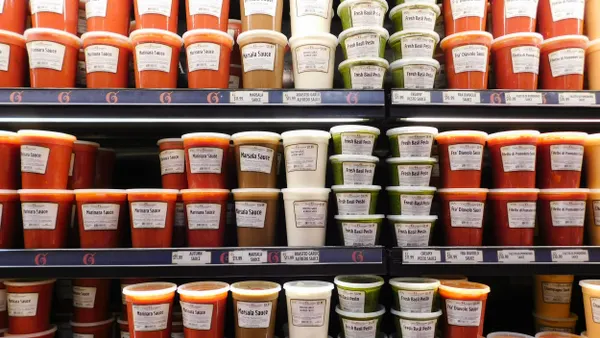Dive Brief:
-
Wal-Mart Stores Inc. has expanded the list of chemicals it is asking suppliers to remove from their products, Bloomberg reports.
-
The eight new chemicals include formaldehyde, triclosan, and Toluene, chemicals Wal-Mart decided on with the help of the Environmental Defense Fund because they include “certain properties that can affect human health or the environment," Wal-Mart said in a statement.
-
The policy affects some 90,000 items made by 700 manufacturers, sold in Wal-Mart and Sam's Club stores and sites, according to the report.
Dive Insight:
Wal-Mart and its warehouse retailer unit Sam’s Club are moving forward on an effort started in 2013 to excise chemicals in products it sells, part of a larger sustainability push.
The move comes as many consumers are increasingly concerned about what potentially harmful substances are found in food, household products, baby products, and beauty items. Target has made a similar effort, broadening its list of banned chemicals from suppliers last year to include nearly 600 substances prohibited in Canada (including coal tars and bisphenol A) as well as triclosan, an anti-bacterial ingredient that was banned in Minnesota, Target's home state, and is being reviewed by the Federal Drug Administration. Target has focused its program on beauty, baby care, personal care, and cleaning products. Chemical-free products may enjoy more marketing and shelf space.
“This is just the natural evolution of consumers today,” Edward Jones & Co. analyst Brian Yarbrough told Bloomberg. “From Wal-Mart’s standpoint, it’s kind of the way they need to be moving.”
There are many such chemicals, not always banned by the FDA, that are found to be problematic: the government doesn’t prohibit the use of or regulate many substances until they’re proven to be harmful. That means they can go years without adequate testing, according to Andrea C. Gore, a researcher at the University of Texas at Austin who has extensively studied the effects of PCBs, BPA, and other chemical compounds in the environment and is editor in chief of the scientific journal “Endocrinology."
Not just consumers, but investors, too, are increasingly looking for similar sustainability and health measures by companies, Richard Liroff, who 10 years ago worked on a shareholder resolution asking Wal-Mart to reduce chemicals in products it sells, told Bloomberg.
“Wal-Mart’s naming specific chemicals strengthens investors’ efforts to move major retailers and manufacturers to safer chemicals, to reduce reputational and liability risk, and to reap financial benefits from growing consumer concern about chemical risks,” Liroff, who runs the Investor Environmental Health Network, told Bloomberg.
The Wal-Mart measure requires manufacturers to list targeted chemicals on their packaging by 2018 and to work to find alternatives. The retailer’s suppliers have removed 95% of the listed chemicals, Bloomberg reports.















